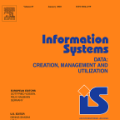In this paper, based on results of exact learning and test theory, we study arbitrary infinite binary information systems each of which consists of an infinite set of elements and an infinite set of two-valued functions (attributes) defined on the set of elements. We consider the notion of a problem over information system, which is described by a finite number of attributes: for a given element, we should recognize values of these attributes. As algorithms for problem solving, we consider decision trees of two types: (i) using only proper hypotheses (an analog of proper equivalence queries from exact learning), and (ii) using both attributes and proper hypotheses. As time complexity, we study the depth of decision trees. In the worst case, with the growth of the number of attributes in the problem description, the minimum depth of decision trees of both types either is bounded from above by a constant or grows as a logarithm, or linearly. Based on these results and results obtained earlier for attributes and arbitrary hypotheses, we divide the set of all infinite binary information systems into seven complexity classes.
翻译:在本文中,根据精确学习和测试理论的结果,我们研究任意无限的二进制信息系统,其中每个系统由一组元素的无限元素和一组在一组元素上定义的无限价值功能(属性)组成。我们考虑信息系统存在问题的概念,由一定数量属性来描述:对于一个特定元素,我们应该承认这些属性的值。作为解决问题的算法,我们考虑两种类型的决策树:(一) 仅使用适当的假设(从精确学习中适当等同查询的类比),和(二) 既使用属性,又使用适当的假设。作为时间的复杂性,我们研究决定树的深度。在最坏的情况下,随着问题描述中属性数量的增加,两种类型决定树的最小深度要么与上面的常数或成成的对数或线性联系起来。根据这些结果以及早先从属性和任意假设中获得的结果,我们将所有无限的二进制信息系统分成七个复杂类别。




